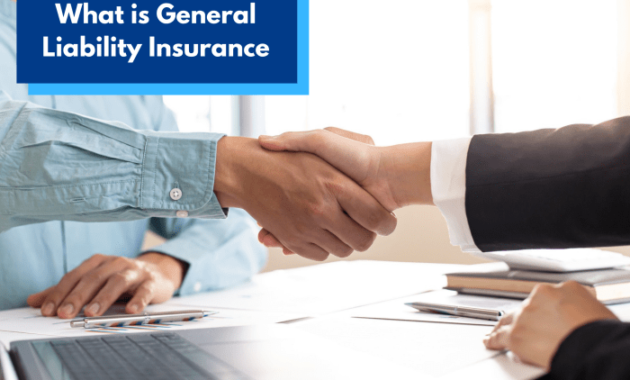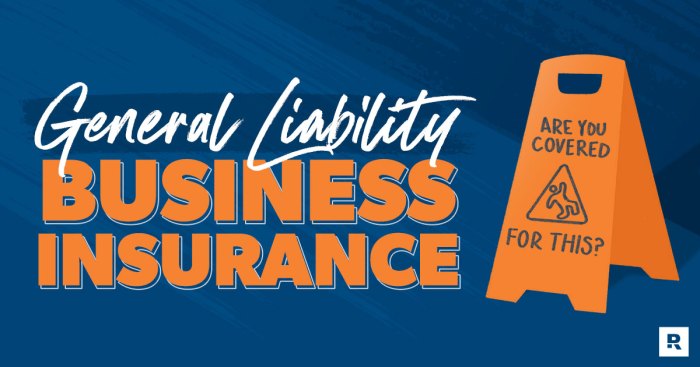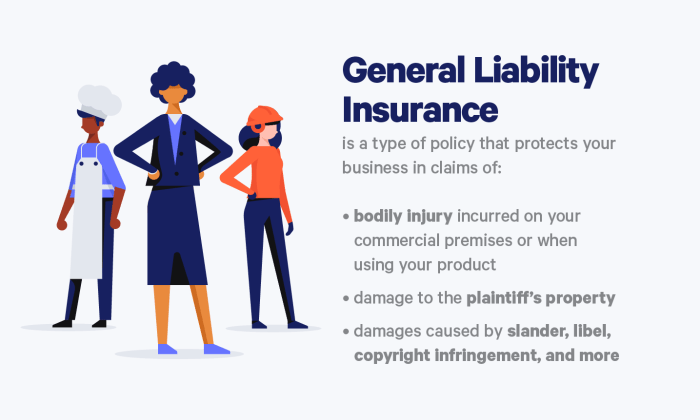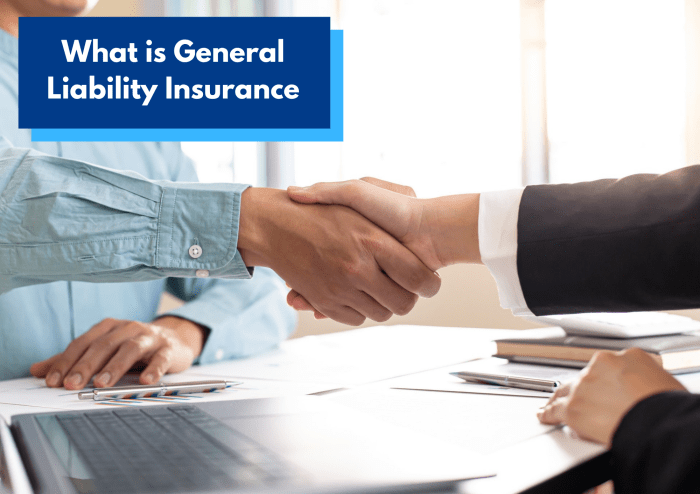
Business General Liability Insurance is a cornerstone of responsible business ownership, offering a crucial safety net against unforeseen circumstances. This comprehensive guide unravels the complexities of this vital insurance type, exploring its core purpose, coverage, cost factors, and the claims process. We’ll delve into scenarios illustrating both covered and uncovered incidents, empowering you to make informed decisions about protecting your business.
From understanding the types of businesses that benefit most from this protection to navigating the intricacies of obtaining a policy and filing a claim, we aim to provide a clear and accessible resource for entrepreneurs and business owners alike. We will also compare general liability insurance with other common business insurance options, highlighting their key differences and benefits.
What is Business General Liability Insurance?

Business General Liability (BGL) insurance is a crucial component of risk management for many businesses. It protects your company from financial losses resulting from claims of bodily injury or property damage caused by your business operations, as well as advertising injury. Essentially, it provides a safety net against unforeseen accidents or incidents that could lead to expensive lawsuits.
Business General Liability insurance’s core purpose is to safeguard your business against the financial repercussions of third-party claims. This includes covering legal fees, settlements, and judgments arising from incidents related to your business activities. It offers peace of mind, allowing you to focus on running your business without the constant worry of potentially crippling legal costs.
Types of Businesses Needing General Liability Insurance
A wide range of businesses benefit from having general liability insurance. While the specific needs may vary depending on the industry and size, most businesses that interact with the public or have employees should consider it essential. This includes, but is not limited to, retail stores, restaurants, service businesses (like plumbers or electricians), offices, and contractors. Even small businesses operating from home can face significant liability risks. The potential for accidents, even minor ones, exists in nearly every business environment.
Examples of Covered Situations
General liability insurance can cover a variety of situations. For instance, a customer slips and falls in your store, injuring themselves. Your general liability policy would likely cover their medical expenses and any legal costs associated with the claim. Or, imagine a contractor accidentally damages a client’s property while working on a project. The insurance could cover the cost of repairs. Another example is if a customer alleges that your advertising caused them financial harm, your policy may offer protection against such claims. The breadth of coverage varies depending on the specific policy, so it’s important to review the policy details carefully.
Comparison of Business Insurance Types
Understanding how general liability insurance differs from other common business insurance types is crucial for effective risk management. The following table highlights key differences:
| Insurance Type | Coverage | Who Needs It? | Examples of Covered Losses |
|---|---|---|---|
| General Liability | Bodily injury or property damage caused by your business operations to third parties; advertising injury | Most businesses interacting with the public or having employees | Customer slips and falls, property damage caused by your employees, libel or slander in advertising |
| Professional Liability (Errors & Omissions) | Claims of negligence or mistakes in professional services | Professionals like doctors, lawyers, consultants | Incorrect financial advice leading to client losses, medical malpractice |
| Workers’ Compensation | Medical expenses and lost wages for employees injured on the job | Businesses with employees | Employee injured while operating machinery, employee suffers a workplace injury |
Coverage Provided by Business General Liability Insurance

Business General Liability (BGL) insurance is designed to protect your business from financial losses arising from certain incidents. A standard policy offers a broad spectrum of coverage, but it’s crucial to understand both what’s included and what’s excluded to ensure adequate protection. This section will detail the common coverage areas, limitations, and the significance of policy limits and deductibles.
A typical BGL policy covers bodily injury and property damage caused by your business operations. This includes incidents occurring on your premises, at a client’s location, or even during off-site business activities. Beyond physical harm and property damage, it also extends to cover advertising injury, which encompasses libel, slander, and copyright infringement. The policy’s specific coverage details will vary depending on the chosen policy and insurer, so reviewing the policy document carefully is essential.
Bodily Injury and Property Damage
This is the core coverage of a BGL policy. It protects your business against claims for medical expenses, lost wages, and pain and suffering resulting from injuries sustained on your premises or due to your business operations. Similarly, it covers damage to a third party’s property caused by your business, such as accidental damage to a client’s equipment during a service call. For example, if a customer slips and falls in your store due to a wet floor, this coverage would help pay for their medical bills and potential legal costs. Or, if a delivery truck accidentally damages a parked car, the BGL policy would cover the repair costs. It is important to note that intentional acts are generally excluded.
Advertising Injury
This section addresses claims related to false advertising, copyright infringement, or libelous statements made in your advertising materials. For instance, if your company’s advertisement falsely claims a competitor’s product is inferior, leading to a lawsuit, this coverage would help defend your business and cover any resulting damages. This coverage is critical for businesses that heavily rely on marketing and advertising. However, exclusions may apply depending on the nature and intent of the advertising.
Policy Limits and Deductibles
Understanding your policy’s limits and deductibles is paramount. Policy limits represent the maximum amount your insurer will pay for covered claims within a policy period. Deductibles are the amount you must pay out-of-pocket before your insurance coverage kicks in. For example, a policy might have a $1 million per occurrence limit and a $1,000 deductible. This means you would be responsible for the first $1,000 of any claim, and the insurer would cover up to $1 million beyond that amount for each incident. Higher limits generally come with higher premiums. Choosing appropriate limits and deductibles depends on your business’s risk profile and financial capacity.
Examples of Excluded or Limited Coverage
While BGL insurance provides broad protection, certain situations are typically excluded or have limitations. These often include intentional acts, employee injuries (covered by workers’ compensation), damage to your own property, and contractual liability (unless specifically added as an endorsement). For example, if a business owner intentionally damages a competitor’s property, this would not be covered. Similarly, if an employee is injured on the job, their claim would be handled under workers’ compensation, not BGL. Careful review of the policy’s exclusions is crucial to avoid unexpected gaps in coverage.
Claims Process for Business General Liability Insurance

Filing a claim under your business general liability insurance policy is a crucial step in protecting your business after an incident. Understanding the process, required documentation, and typical timeline can significantly ease the stress and improve the efficiency of the claim resolution. This section details the steps involved in a typical claim.
Steps Involved in Filing a Claim
Prompt notification is paramount. Following an incident covered by your policy, contact your insurance provider immediately. Delaying notification can jeopardize your claim. The specific steps may vary slightly depending on your insurer, but generally include reporting the incident, providing necessary documentation, cooperating with the investigation, and potentially negotiating a settlement. Failure to cooperate fully can negatively impact your claim’s outcome.
Documentation Required to Support a Claim
Supporting your claim with comprehensive documentation is vital for a successful outcome. This typically includes a detailed account of the incident, including date, time, location, and individuals involved. Police reports, witness statements, medical records (if applicable), repair estimates, and invoices are all valuable supporting documents. Photographs or videos of the incident and resulting damages can also strengthen your claim. Maintaining accurate and detailed business records is crucial for substantiating your claim and demonstrating the extent of your losses. For example, if a customer slips and falls in your store, you would need photos of the scene, medical bills for the customer’s injuries, and police reports if one was filed.
Typical Timeline for Claim Processing and Settlement
The time it takes to process and settle a claim varies depending on several factors, including the complexity of the incident, the amount of damage, and the availability of necessary documentation. Simpler claims might be resolved within a few weeks, while more complex cases could take several months or even longer. Your insurer should provide regular updates on the progress of your claim. For instance, a minor property damage claim might be settled quickly with a direct payment, whereas a significant liability claim involving extensive injuries and legal action could take considerably longer due to investigations and potential litigation.
Effectively Communicating with the Insurance Provider
Maintaining clear and consistent communication with your insurance provider throughout the claims process is crucial. Respond promptly to all requests for information and documentation. Keep detailed records of all communication, including dates, times, and the content of conversations. If you have questions or concerns, don’t hesitate to contact your insurer directly. Clearly articulate your concerns and maintain a professional and cooperative attitude. For example, if there’s a delay in processing your claim, proactively contact your insurer to inquire about the status and any required action from your end. Regular follow-up demonstrates your commitment to resolving the claim efficiently.
Closure
Securing adequate Business General Liability Insurance is not merely a financial consideration; it’s a strategic move that safeguards your business’s future. By understanding the nuances of coverage, costs, and the claims process, you can confidently navigate potential risks and protect your investment. Remember to compare quotes from multiple providers and thoroughly review your policy to ensure it aligns with your specific business needs. Proactive risk management and comprehensive insurance are key ingredients in building a resilient and successful enterprise.
Detailed FAQs
What is the difference between general liability and professional liability insurance?
General liability covers bodily injury or property damage caused by your business operations. Professional liability (errors and omissions insurance) covers claims of negligence or mistakes in professional services.
How long does it take to get a general liability insurance policy?
The time varies depending on the insurer and the complexity of your application. It can range from a few days to a few weeks.
Can I get general liability insurance if I work from home?
Yes, many insurers offer policies for home-based businesses. However, you may need to disclose your home address and working conditions.
What happens if my policy is cancelled?
Your coverage will cease, and you’ll need to secure a new policy to maintain protection. It’s important to understand the reasons for cancellation and address them to avoid future issues.
What if I have multiple locations for my business?
You’ll need to inform your insurer of all locations. Coverage and premiums may be adjusted based on the number and type of locations.